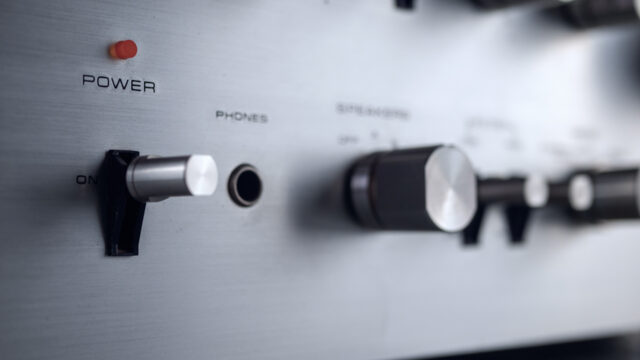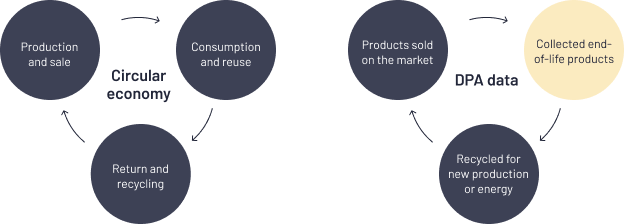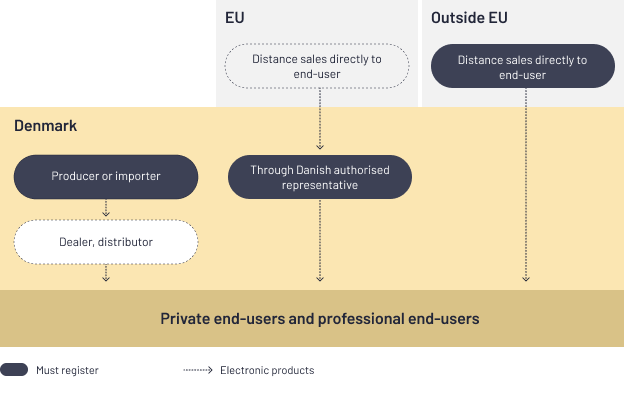
Producer responsibility is a key element of the circular economy
In societies based on a circular economy all materials and substances are valuable and have a genuine value. This also applies when products have become waste. The transition to a more circular economy not only holds a huge potential for the environment, but also for the competitiveness of Danish businesses.
Producer responsibility pays off
Circular economy is about creating sustainable growth. It is about using our natural resources and designing products in a way that extracted raw materials are used in a respectful manner and as many times as possible. They should not end up in a landfill, but in a new product. Therefore, an efficient organisation of your producer responsibility may be profitable from a resource point of view, and thereby also from an economic angle.
The idea behind passing on the responsibility for certain product streams – also at the end of their useful life – to those businesses that produce or sell the products is to establish an incentive to develop more environment-friendly and recyclable products, allowing the contained materials to enter into new production cycles.
Take-back of your products
Producer responsibility gives the opportunity to all end-users to discard their end-of-life products free of charge, be it electronics, batteries, or vehicles. Thereby, producers and importers can retrieve the material resources from the products to incorporate them into new production or sell them to the recycling or raw materials industries.
Two key elements
If you are not familiar with the above terms you may start here.
National register
First, all businesses that wish legally to sell electronics, batteries, or vehicles must register in the national producer register of the relevant country. In Denmark the producer register is found in DPA.
Reporting
Another key element of the producer responsibility system is the duty to report. Two aspects decide who has the duty to register and report annually – thereby having the producer responsibility in the Member State:
-
- Type of product
- Business’s role in the market
Identify your business
Producer, importer, and distance selling
Legislation covers:
- All producers and importers who wish to sell electronics, batteries, or vehicles in Denmark.
- All producers, importers and other commercial enterprises selling in-scope products in their own name or brand.
- All businesses in other EU Member States or in non-EU countries that sell directly to end-users in Denmark through distance selling or on the internet.
Dealer or distributor
If you buy your electronic products, batteries, or vehicles from a Danish supplier, your business does NOT have producer responsibility and you must not make a registration. In return, you must make sure that the supplier you deal with has taken on their responsibility in Denmark, since otherwise it is not legal to buy their products.

Producer register
Approved businesses
In the public part of the producer register you can search out businesses assuming their producer responsibility and thereby approved for placing electronics, batteries, or vehicles on the market in Denmark.
Search out approved businessesShortcuts
Products
See which products are covered by producer responsibility
Registration
See why a registration is necessary and how to proceed
Reporting
See the purpose of the annual reporting 1 January – 31 March
Economy and fees
See information about fees and fee rates etc.
Compliance schemes
See information about Authorised representative and collective vs individual schemes
Municipalities and collection sites
See more about the municipalities’ role in the producer responsibility system
Allocation
See more about allocation of waste collected by the municipalities and collection sites
Other players
See the large number of other players that are involved in the producer responsibility system in various ways
European registers
See other EU registers and European exchange of experience and harmonisation (EWRN)
Legislation
See EU legislation and Danish implementation as well as product-specific regulation
History and purpose
See the background of the establishment of the producer register and DPA
Central concepts
Allocation in connection with the producer responsibility is the process of allocating responsibility to producers or coleective schemes for management and recycling of waste from their products after use. If a company’s share of total packaging quantities put on the market in Denmark is not large enough for a geographical allocation, this company will be charged with a handling fee.
All product areas under the producer responsibility system have a set of pre-determined categories under which products must be categorised and registered. This system has been set up so reports from the different Member States become as harmonised as possible.
A collective scheme is a company offering to assume various tasks on behalf of producers who are members of that scheme. In practice, the producer becomes a member of the collective scheme which will then make sure, among others, that data are reported in the producer register on behalf of the producer. Producers in a collective scheme are not allocated a take-back quantity individually. The collective scheme gets a national allocation on behalf of its members.
National register; similar organisations exist in all EU Member States. DPA is an independent organisation with delegated authority responsibility; it works as the interconnection between authorities and companies. We have been assigned the task to develop and operate the IT systems which support the producer responsibility. We communicate on legislation and collect data and knowledge about the different producer responsibility areas. It is with DPA that you must register your company and report data on the products subject to producer responsibility. See also producer register.
If producers do not assume their producer responsibility, DPA can deactivate/delete them in the producer register. If your company has been deactivated, you do not comply with the law when you sell your products in Denmark. Also, the company cannot be searched out among approved companies.
Distance selling is when a company sells products, empty packaging, or filled packaging to end-users, e.g. online sale to other countries in the EU or EEC. If your company is active in this business, you must have an authorised representative (AR) in each country you sell to. For electronics and batteries, you must state this distance sale upon your registration.
Abbreviation used as a general term in connection with the producer responsibility legislation. EPR is a regulation tool under the environmental legislation.
End-user means the place where the packaging presumably becomes waste. A distinction is made between Households and Professional users. ‘Households’ means that the packaging presumably becomes waste at private consumers, while packaging waste from Professional users means all the waste that does not come from Households.The end-user segment is used in connection with the producer responsibility to reflect the design of products and the distribution of responsibilities in the management of end-of-life products.
Producer responsibility means that your company is responsible for the products you make available in the product’s entire life cycle, until it becomes waste. If you get allocated one or more municipalities where you must collect packaging waste you are obliged to provide a financial guarantee so the task can be solved, also if you cannot collect it yourselves. The financial guarantee thereby ensures that funds are available to collect packaging quantities in the municipalities allocated to you.
To be subject to the producer responsibility, you must make covered products available on the Danish market (electronics, batteries, vehicles, packaging, or certain single-use plastic products). ‘Make available’ is defined as the supply of, for instance, empty packaging, or filled packaging in view of distribution, consumption, or use on the Danish market as part of a commercial activity, be it with or without remuneration.
The producer register holds producers subject to the different producer responsibility areas, including packaging, fishing gear, electronics, batteries, vehicles etc. The register is public, and it is free to search it; this function is used, among others, by tenderers to check whether a potential supplier has assumed their producer responsibility. Also, customs officers and environmental authorities use the public part of the register when importers are taking their goods into Denmark. Producers must make sure to register.
See Make available.

